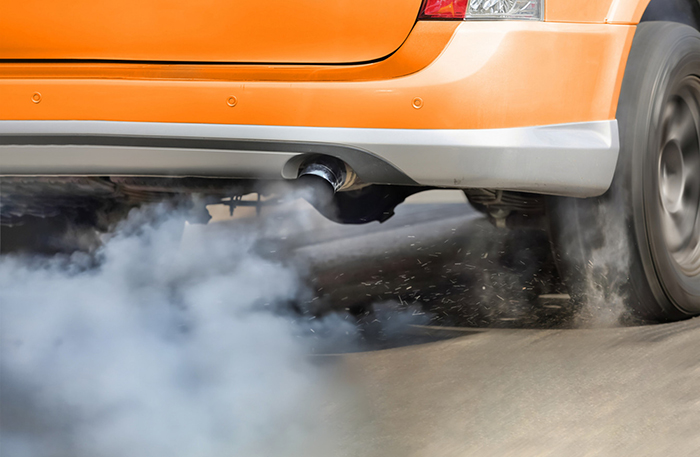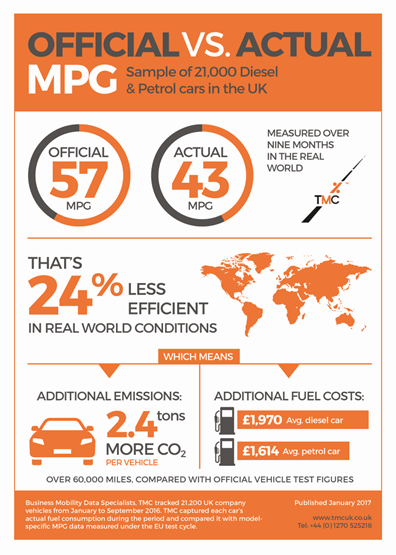Diesels now 28% less efficient than advertised
Diesel now 28% less efficient than advertised
New figures released by TMC (The Miles Consultancy) in the UK has revealed that the real-world fuel economy figures of new cars have fallen further behind the manufacturers advertised performance indicators in 2016.
TMC analysed the performance of 21,200 fleet cars in relation to mileage and fuel consumption to quantify the impact of the widening gap between what is advertised and what is the real-world facts.
TMC provides its clients in the UK and Europe with a range of cost-reduction, data analysis and consulting services around business vehicles and employee mobility. The company derives it real-world mpg information from consolidated data it holds on thousands of vehicles’ mileages, fuel consumption and technical specifications.
The analysis criteria analysed each individual car’s official mpg figure with its actual performance which they logged on TMC’s own database of fuel transactions and mileage reports.
What was discovered?
What they discovered was that diesel cars used a massive 28%, on average, more fuel on the road than was reported under the manufacturer's official test conditions.
This was actually up from 25% the previous year. They did discover, though, overall advertised consumption of the diesel cars in the sample test group had improved readings from 62 mpg in 2015 to 66 mpg in 2016 but their economy under real-world conditions improved by only 0.9mpg.
It was also discovered that official mpg test results for petrol cars are actually slightly closer to real-world conditions but they still recorded a 19% shortfall. It was found, on average, petrol car drivers were able to achieve 9 mpg less than their official fuel economy figure.
What this suggest is that car makers are increasingly understating real fuel costs and the officially-published data paints a too-optimistic picture of exhaust emissions. In the real world, it equates to nearly using £1,800-worth more in fuel and emitting 2.4 tonnes more CO2 per car over a typical fleet leasing cycle of 60,000 miles.
A discrepancy in the data?
Paul Hollick, Managing Director of The Miles Consultancy (TMC) and who is also the Chairman of the Institute of Car Fleet Management (ICFM) had this to say, “In this sample alone, we are looking at a total annual discrepancy of around £50 million in fuel costs and 17,000 tons of CO2,” said Paul Hollick, managing director of TMC.
“The question businesses should ask themselves is whether it is still commercially or environmentally sustainable for them to rely on official figures that are 30% adrift when, these days, they can easily build fully-accurate, real world data about their fleet assets into policy and operational decisions.
“Of all the factors affecting real-world fuel economy, drivers are undoubtedly the largest influence. Our data enables employers to identify the worst performers and target them for training or other methods of improvement.”
Coming soon is a new mpg/CO2 test cycle that has been designed to be more representative than the current 30-year-old test cycle. What has been discovered by these latest revelations has highlighted the fact that official mpg and CO2 benchmarks are being obtained under artificial conditions.
“Nothing can beat the value of real-world information from your own assets,” he added. “In 2017, every fleet can obtain the tools to capture it and use it to drive cost savings and higher productivity.”
[Comparison between the official (Vehicle Certification Agency) published fuel consumption data and real-world data held by TMC for 20,121 diesel vehicles and 1,079 petrol vehicles. Tracking period: January 2016 to September 2016.]

Author

Justin Kavanagh
Justin Kavanagh is a recognised leader
in automotive intelligence and vehicle
data supply to the entire motor industry.
He has almost 20 years experience in
building systems from the ground up.
As the Managing Director of Vehicle
Management System, he understands the
need and importance of trustworthy and
reliable vehicle history and advice to
both the trade and the public.
Follow me on LinkedIn

